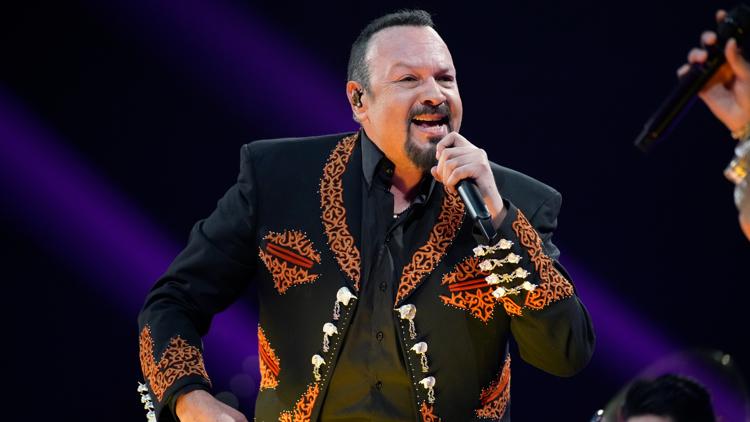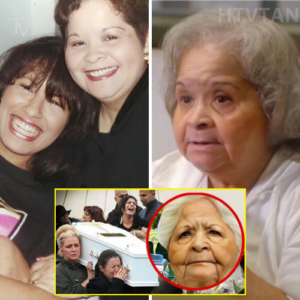Mexican actor and singer Antonio Aguilar was already performing in Hollywood when, in 1960, he forged one of the greatest unions of Southern California entertainment families by marrying singer and actress Flor Silvestre. Aguilar, with credits in American western films like “The Undefeated” starring John Wayne, and Silvestre, a leading star of the “golden age” of the Mexican film industry, raised their children on the road while the couple delivered a first-of-its-kind equestrian sports and music show – la charrería or jaripeo – across international stages.

Sixty years later, their son, Pepe Aguilar – a four-time Grammy winner with over 13 million albums sold – is at the helm of the family’s next generation of stars: Pepe’s children, 24 year-old Leonardo and 20 year-old Angela, along with Pepe’s brother Antonio Jr., are currently on the U.S. leg of their updated jaripeo tour that incorporate theatrics, circus tricks, artificial intelligence, operatic performances on horseback on a 360-degree-style stage.
And that’s just the tip of the iceberg: Angela sells her own perfume and doll, and Pepe is currently working and actively pitching scripted television series (more on that later). Pepe, who just recently released his “Que Llueva Tequila” album, has no plans of slowing down.
After suing his first label over ownership of his masters and publishing rights in the 2000, Pepe released music as an independent artist and went on to launch his own labels Machín Records and Equinoccio Records. Working under a (recently) signed worldwide agreement with Virgin Music Group, Universal Music Group’s services and distribution division, Pepe has complete ownership of his masters. He is also spearheading the careers of his children, both of whom are signed to his labels, along with accordionist Irany Divad, who was a part of Karol G’s band for her massive “Mañana Será Bonito” stadium tour.
The family is used to sharing each other’s resources, but as his kids get older, Pepe is cognizant of a looming evolution of the Aguilar family. While Pepe returned to his rock roots for his new 13-song LP, blending his traditional mariachi with edgy guitars, his children found new audiences in the United States with successful collaborations – including “Por El Contrario” with Becky G. Angela also became a Grammy nominated artist in 2018 for her “Primero Soy Mexicana” album.
“When it comes to the industry, there’s a lot we have to think about now that I didn’t necessarily have to deal with when I was first developing as an artist,” Pepe tells Variety. “My father and I were tremendously different when it came to doing business, but he always encouraged me to have a grasp of what the big picture was: This is not just a family affair – this is a business.”
Below, Pepe gives insight to the future of his million-dollar catalog, pulls back the curtain on his past and future business deals, and offers his thoughts on música mexicana’s place at the 2024 Latin Grammys.

You are probably one of the only successful mariachi artists who has been willing to evolve the genre, not just sonically, but in the way you present the music on tour. How intentional is that approach to your business?
I wasn’t planning on doing something like this – the fusion of mariachi and rock, and our presentation of the show visually does reflect the growth of the genre in today’s standards. But this fusion has existed in me forever – from the lyrics to the harmonies and orchestration. The group of instruments that informs mariachi is very unique. You can almost do whatever you want with them, so it’s in constant evolution – even if people are quick to think of it as an “age-old” style.
I think that mariachi will stay very traditional, and traditional mariachi will never die. But it’s like classical music in the sense that it will evolve.
You were in a rock band called Equs in your early adulthood– was your father supportive of your desire to branch out?
My father wasn’t supportive, but he also wasn’t an obstacle. He just said, “Son, I don’t think it’s going to be good for you.” And he was right on that one – and many, many other ones.
Was he as much of an obstacle when it came to making the decision to go independent, and to sue Musart (a division of Concord Music Group)?
I had no idea how hard it would be to sue a label when I decided to pull that trigger. But I’ve always been one to fight for what’s right, and when you start selling millions and you keep on getting, like, 3% or 5% of everything – that’s a red flag. And it should be a red flag for all artists at any stage of their career, but that was the system at the time. So maybe it was a thing of my generation, different from my father’s and my mother’s. Maybe they were focused on something else, or they were only focused on doing live shows. But I saw entertainment as a universe of opportunities, and the company I was with wasn’t doing business in a fair way.
News
Esta es la reacción de Lalo Capetillo al ver a Lucerito Mijares maquillada…. sus ojos decían que los rumores eran ciertos
Lucerito Mijares: La hija de los famosos que sigue escribiendo su propia historia Lucerito Mijares, hija de los reconocidos artistas Lucero y Manuel Mijares, ha estado en el ojo público desde su nacimiento, pero recientemente ha generado aún más atención…
Selena Quintanilla y la negociación con el FBI
La trágica muerte de Selena Quintanilla: El asesinato que conmocionó al mundo El 31 de marzo de 1995, el mundo de la música latina sufrió una de sus pérdidas más grandes. Selena Quintanilla, la “Reina del Tex-Mex”, fue asesinada por…
Yolanda Saldívar FINALMENTE….
La Trágica Muerte de Selena Quintanilla: El Misterio de Yolanda Saldívar y su Nueva Docuserie El asesinato de la reina de la música tejana, Selena Quintanilla, sigue siendo uno de los episodios más conmocionantes y trágicos en la historia de…
FINALMENTE Yolanda Saldivar y se Confirman los Rumores
La Muerte de Yolanda Saldívar: ¿Cierre o Nueva Tragedia? El 18 de octubre de 2024, la noticia del fallecimiento de Yolanda Saldívar, la mujer condenada por asesinar a la estrella de la música Selena Quintanilla, se propagó rápidamente por las…
Después de 25 AÑOS 📺 te decimos…..
El asesinato de Paco Stanley: Entre leyenda y misterio Paco Stanley es, sin duda, una de las figuras más icónicas de la televisión mexicana. Con su carisma, humor y estilo único, se ganó el corazón de millones de mexicanos durante…
La Hija De Flor Silvestre FINALMENTE Confirma Los RUMORES
Flor Silvestre: La Voz y el Legado de una Leyenda Mexicana Flor Silvestre, nacida como Guillermina Jiménez Chaboya el 16 de agosto de 1930 en Salamanca, Guanajuato, fue una de las artistas más importantes de la música y el cine…
End of content
No more pages to load











